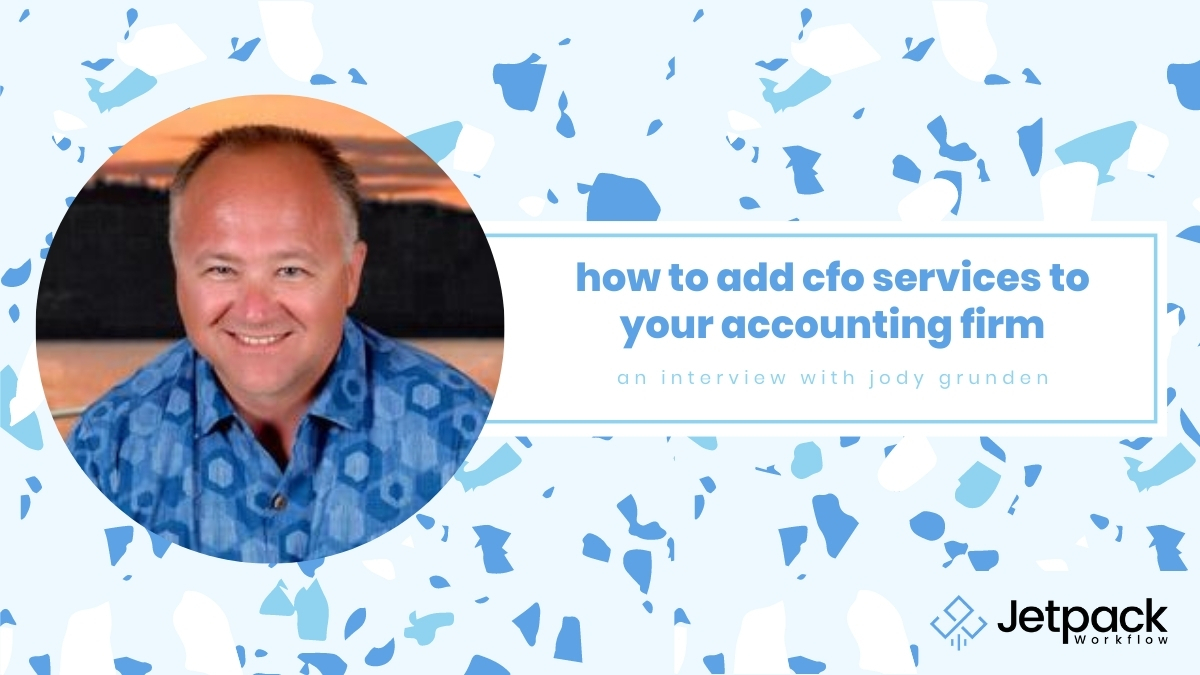How to Add CFO Services to Your Accounting Firm

Jody Grunden is the CEO and Co-Founder of Summit CPA Group, a virtual tax and accounting firm that also offers CFO services to its clients. In addition to that, Jody is an official member of the Forbes Finance Council.
In today’s show, David and Jody talked about how you can begin adding CFO services to your accounting firm. Why would you add CFO services in the first place? How do you introduce this new dimension to your service list? And how do you make the service scalable so others in your firm can provide advisory services aside from you?
Those are a few of the topics discussed in today’s show. Listen to the podcast for all the details, or read our summary below!
Podcast
Summary
- Becoming an adviser instead of only an accountant
- The importance of having set agendas for meetings
- The meeting structure Summit CPA uses
- How to start offering CFO services
- Making this service scalable
Connect With the Guest
Related Articles
- Lift Customer Conference Recap
- How to Manage a 35-person Remote Team Without Client Work Falling Through the Cracks
- Workflow Management for Remote Accounting Teams
What Summit CPA Group Does
Summit CPA Group is a virtual tax, accounting, and CFO firm with over 50 remote employees. Even before COVID-19 made it necessary to just about everyone, Summit was completely online and remote. They also continue to grow, taking on about 8 new employees per year.
The key aspect of Summit’s business that we’re focusing on today involves the array of CFO and consulting services they offer to clients.
Summit averages around $68,000 per engagement. This can range from around $30k to $200k per client, a number that is then divided by 52 weeks and charged weekly. They have no contract, so clients can hire them one week and “fire” the service any time they feel it isn’t worth their investment.
Why not trap clients into a contract or minimum charge? @SummitCPAGroup is part of their client’s team. And just as an employee can be hired today and fired tomorrow, Summit has a similar dynamic. “If we can’t perform, we don’t deserve to be their CFO.
Getting fired isn’t a regular occurrence, though. Just as with any company offering a subscription model, a key metric they watch is client retention. A typical engagement lasts over 3 years, according to Jody. In fact, even then, clients often use the CFO services until they reach their exit strategy, be that retirement or selling their firm. Summit’s retention rate is over 90%.
Why Offer CFO Services
So why would a tax or accounting firm want to add CFO services to their company? Jody gives a few reasons.
1. Accountants are advisors by nature.
As you pour through a client’s records regarding expenses, payroll, income, and taxes, you’ll likely see things that the company can do to maximize profits or create a leaner budget. Why not create a service where you help your clients make more money?
2. Offering these services can save you work in the long run.
If you have clients that only come to you once a year during tax season, do you spend inordinate amounts of time pouring through their records? Do you find their finances in a mess, like a tangled web you have to straighten out? If you offered more services year-round, then those papers and records would be in order. Then, come tax season, your work would be more streamlined.
3. Looking at future projections and setting financial and business goals is more fun than only looking at historical stuff.
Jody noticed this about meetings with his clients, as well. Going over historical information is boring and stressful. The client might have messed up, causing them to lose money. They don’t want to rehash that again in front of more people. And even if there isn’t an embarrassing mistake, talking about what’s already happened isn’t exciting for the entrepreneur or business owner. They want to look forward to the future. They want to make plans and set goals. That’s what excites them, and that’s the kind of conversations you can have in your capacity as CFO.
How to Get Started With CFO Services
Let’s say you’re interested in offering CFO services to your clients. How do you get started doing so? First, click here and get a free playbook that walks you through some of the most important steps. The link is above, in the resources list, as well.
This is how Summit got started in offering CFO services. For a long time, they offered almost exclusively tax services. That means that they only saw all of their clients once a year or so. But, as stated above, that made things unnecessarily complicated.
At some point, they took a few of their biggest clients and offered to work with them throughout the year. They simply took what they’d normally charge during tax season, divided it by 12, and charged them monthly to help keep their records in order. Then, come tax season, all they had to do was file the paperwork.
Then they added new services to that overtime. Why not offer to meet with the client once a month to discuss how things are going? What about twice a month, or even every week? Now you’ll have the opportunity to talk about financial goals and analyze the company’s pipeline to add further value.
Jody suggests doing this one client at a time to get started. Summit charged nothing extra for preliminary CFO services. They simply took what they’d charge for taxes and divided it over 12 months. But he suggests you charge what you feel comfortable charging. Your prices will go up over time, and you’ll have to work out exactly how to execute these CFO services for your specific clients.
Have Set Agendas For Meetings
One thing Jody suggests is to have set agendas or topics for your meetings. This will make meetings with your clients more productive, and it will inform who should be present at each meeting.
For example, if you have a client that you meet with weekly, the first meeting of the month might be mostly historical. How did we do last month? The next meeting might be about forecasting and goal setting. Another meeting might be dedicated to the company’s pipeline.
A meeting with a prepared agenda will be more productive and efficient.
On top of that, standardizing how you plan your meetings will help you make the CFO services you offer more scalable.
Making the Service Scalable
If you’re a firm owner, you probably don’t want to be the CFO of every client. When you’re starting out and offering this service to only a few clients, this isn’t a problem. But what if you expand to hundreds of clients? It wouldn’t be possible for one person to attend that many weekly meetings, let alone have the mental bandwidth to provide worthwhile advice to each client.
That being the case, you’ll want to make the process scalable so you can have multiple members of your firm acting as CFOs of various clients. How can you do that?
We’ve already talked about setting set agendas for the meetings you have with your clients. This will help tremendously.
On top of that, Jody suggests taking a few people from your firm along to these meetings. At minimum, he sends a CFO and an accountant to each meeting. Why? For one thing, this makes the client feel well taken care of. It doesn’t cost the client more because you aren’t billing by the hour, remember? This is a weekly subscription service if you’re following Summit’s example. So having more than one firm member at each meeting gives the client peace of mind. They’ll also have different people to reach out to depending on the questions or issue they’re having.
Finally, bringing new people along will allow you to train others in your firm to act as CFO to other clients, allowing you to offer this service to more companies.If you’re interested in offering CFO services as an accounting firm, be sure to snatch the free playbook! Summit CPA has recently started offering training to other firms so they can start offering CFO services to their clients. This is a great opportunity to learn from their experience, giving you a head-start in helping your clients in this new dimension of financial goal-setting and consultation.





